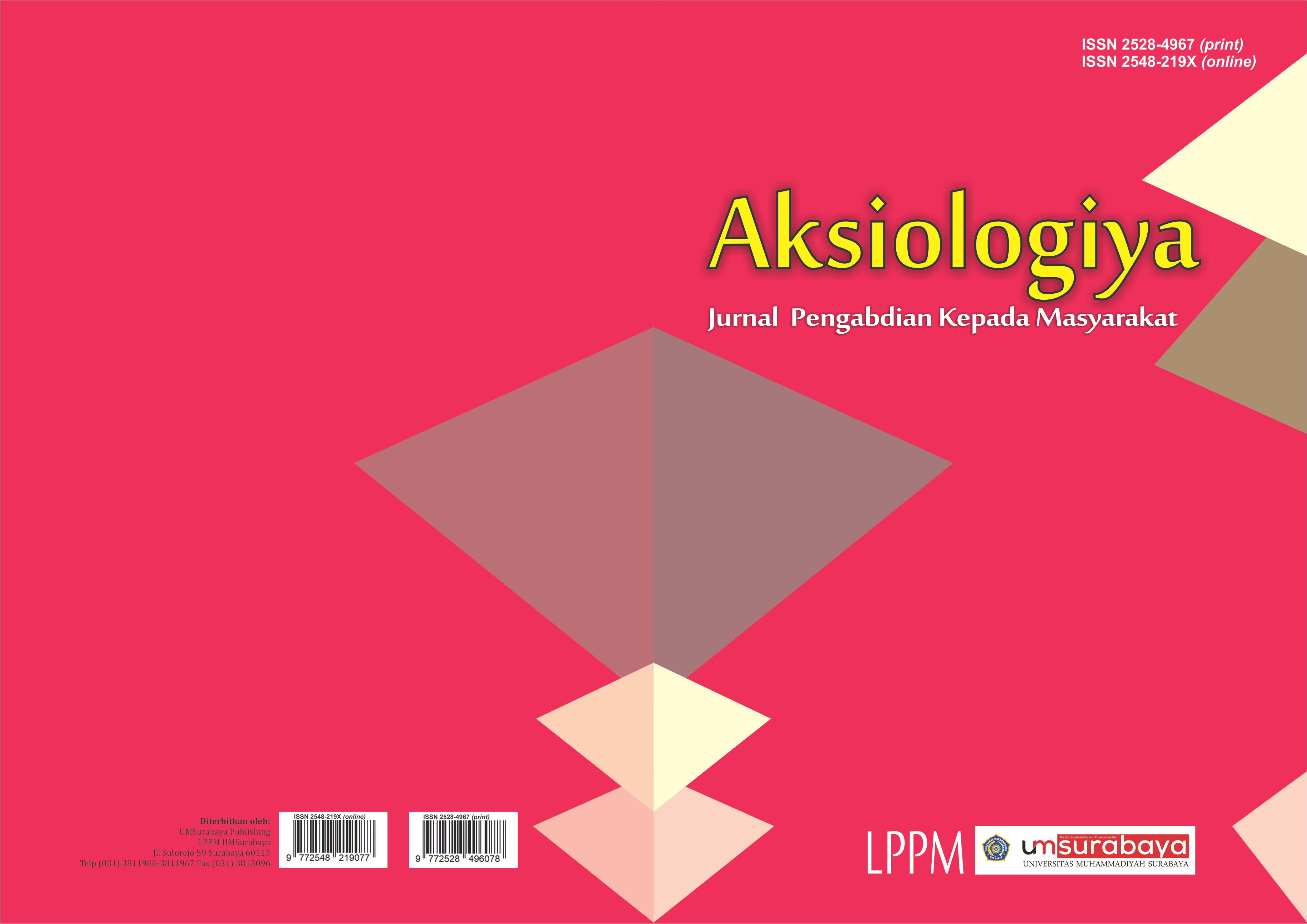Isi Artikel Utama
Abstrak
ABSTRAKÂ
Pemanfaatan dan pengembangan konten digital adalah persyaratan yang harus terpenuhi untuk menjadi guru profesional Abad 21. Hal ini yang kemudian membuat adanya kebutuhan mendesak dikalangan guru yang sudah lama berkecimpung dalam profesi pendidikan. Berdasarkan survey yang dilakukan melalui kuesioner online (Google Form), responden (n=83) dari beberapa sekolah dan beberapa mata pelajaran mengayatakan bahwa kebutuhan keterampilan pembuatan konten digital pembelajaran merupakan prioritas utama (n=42) dan diikuti kebutuhan pembuatan online classroom and mobile learning (n=38). Artikel ini bertujuan untuk menyampaikan identifikasi masalah, analisa kurikulum, implementasi solusi, dan evaluasi hasi dari kegiatan pengabdian pada masyarakat dalam bentuk pelatihan pengembangan konten digital pembelajaran untuk guru di Kota Tangerang.Â
Kata Kunci: konten digital; pembelajaran informatika; sumber terbuka.
ABSTRACTÂ
Digital content development and utilization are considered as high requirements that must be mastered by qualified teachers in this 21st century learning. The needs eventually create gaps between prior teachers’ competencies and the requirements for further qualifications. An online survey delivered through Google form was conducted to validate this hypothesis. The survey found that respondents (n=83) who were school teachers from different learning subjects expressed that they demanded new skills on digital content development and utilization. It was considered as the highest priority (n=42) among any others skills related technology enhanced learning, such as online classroom or mobile learning (n=38). This article is aimed to describe the process of problem identification, curriculum analysis, the implementation of solution, and program evaluation of a community service activities entitled ‘Training of Digital Content Development for School Teachers’.Â
Keywords: computer science education; digital content; open sources.
Â
Kata Kunci
Rincian Artikel
Hak cipta artikel dimiliki oleh jurnal AKSIOLOGIYA
Ciptaan disebarluaskan di bawah Lisensi Creative Commons Atribusi-NonKomersial 4.0 Internasional.
Referensi
- Bandura, A., & Walters, R. H. (1963). Social learning and personality development.
- Bichelmeyer, B. (2005). The ADDIE model: A metaphor for the lack of clarity in the field of IDT. IDT Record.
- Davis, A. L. (2013). Using instructional design principles to develop effective information literacy instruction: The ADDIE model. College & Research Libraries News, 74(4), 205-207.
- De Ree, J., Muralidharan, K., Pradhan, M., & Rogers, H. (2015). Double for nothing? Experimental evidence on the impact of an unconditional teacher salary increase on student performance in Indonesia (No. w21806). National Bureau of Economic Research.
- Fullan, M. (1994). Coordinating top-down and bottom-up strategies for educational reform. Systemic reform: Perspectives on personalizing education, 7-24.
- Gustafson, K. L., & Branch, R. M. (2002). What is instructional design. Trends and issues in instructional design and technology, 16-25.
- Molenda, M. (2003). In search of the elusive ADDIE model. Performance improvement, 42(5), 34-37.
- Robin, B. (2006). The educational uses of digital storytelling. In Society for Information Technology & Teacher Education International Conference (pp. 709-716). Association for the Advancement of Computing in Education (AACE).
- Tatang, M. A. (2007). Institutional Needs and Assessment of S1 Elementary School Education Program Develeopment Implementation and Use of ICT at UNY. International Workshop Strengthening Institutional Capacity in Elementary Teacher Education, July 30th - August 2nd, USINTEC-Universitas Negeri Jakarta.
- UNESCO. (2003). Building Capacity of Teachers/Facilitators in Technology-Pedagogy Integration for Improves Teacing and Learning, Final Report: 18-20 June 2003, Bangkok Thailand.
- Yi, M. Y., & Davis, F. D. (2003). Developing and validating an observational learning model of computer software training and skill acquisition. Information Systems Research, 14(2), 146-169.
- Yusuf, A. E. (2016). The Implementation of ICT Based Education in Elementary teacher Education (PGSD) in Indonesia. Humaniora, 7(1), 8-14.
Referensi
Bandura, A., & Walters, R. H. (1963). Social learning and personality development.
Bichelmeyer, B. (2005). The ADDIE model: A metaphor for the lack of clarity in the field of IDT. IDT Record.
Davis, A. L. (2013). Using instructional design principles to develop effective information literacy instruction: The ADDIE model. College & Research Libraries News, 74(4), 205-207.
De Ree, J., Muralidharan, K., Pradhan, M., & Rogers, H. (2015). Double for nothing? Experimental evidence on the impact of an unconditional teacher salary increase on student performance in Indonesia (No. w21806). National Bureau of Economic Research.
Fullan, M. (1994). Coordinating top-down and bottom-up strategies for educational reform. Systemic reform: Perspectives on personalizing education, 7-24.
Gustafson, K. L., & Branch, R. M. (2002). What is instructional design. Trends and issues in instructional design and technology, 16-25.
Molenda, M. (2003). In search of the elusive ADDIE model. Performance improvement, 42(5), 34-37.
Robin, B. (2006). The educational uses of digital storytelling. In Society for Information Technology & Teacher Education International Conference (pp. 709-716). Association for the Advancement of Computing in Education (AACE).
Tatang, M. A. (2007). Institutional Needs and Assessment of S1 Elementary School Education Program Develeopment Implementation and Use of ICT at UNY. International Workshop Strengthening Institutional Capacity in Elementary Teacher Education, July 30th - August 2nd, USINTEC-Universitas Negeri Jakarta.
UNESCO. (2003). Building Capacity of Teachers/Facilitators in Technology-Pedagogy Integration for Improves Teacing and Learning, Final Report: 18-20 June 2003, Bangkok Thailand.
Yi, M. Y., & Davis, F. D. (2003). Developing and validating an observational learning model of computer software training and skill acquisition. Information Systems Research, 14(2), 146-169.
Yusuf, A. E. (2016). The Implementation of ICT Based Education in Elementary teacher Education (PGSD) in Indonesia. Humaniora, 7(1), 8-14.


